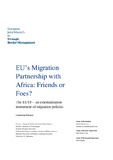| dc.contributor.author | Dumitrescu, Sandra | |
| dc.contributor.other | Vara, Juan Santos, First Supervisor | |
| dc.contributor.other | Rijpma, Jorrit, Second Supervisor | |
| dc.contributor.other | Frontex – European Border and Coast Guard Agency | |
| dc.date.accessioned | 2020-03-11T06:38:30Z | |
| dc.date.available | 2020-03-11T06:38:30Z | |
| dc.date.issued | 2017 | |
| dc.identifier.uri | https://digiriiul.sisekaitse.ee123456789/2437 | |
| dc.description | 1. Introduction ; 1.1. General considerations ; 1.2. A migration-related country profile: Mali and Niger ; 1.2.1. Mali ; 1.2.2. Niger ; 1.2.3. Mali and Niger: different contexts, yet a common EU approach ; 2. Literature review ; 2.1. EU policy developments ; 2.2. Externalization ; 2.3. Irregular migration from the African continent towards the EU: a literary perspective ; 2.4. EU Emergency Trust Fund for Africa ; 3. Research methodology ; 3.1. Research focus ; 3.2. Research strategy ; 3.3. Research design ; 3.4. Cases studies design ; 3.5. Data collection and analysis ; 3.5.1. Desk research ; 3.5.2. Conducting interviews ; 3.5.3. Direct (participant) observation ; 3.6. Research quality indicators ; 4. The EU Trust Fund in Mali and Niger ; 4.1. The EU Trust Fund: origin and evolutions ; 4.2. EUTF in the Sahel and Lake Chad ; 4.3. EUTF in Mali ; 4.3.1. General context ; 4.3.2. The PARSEC Project ; 4.3.3. The GAR-SI project ; 4.3.4. Project on ‘Strengthening the management and governance of migration, return and durable reintegration in Mali’ ; 4.4. The EUTF in Niger ; 4.4.1. General considerations ; 4.4.2. The Joint Investigation Teams ; 4.4.3. ‘Strengthening the management and governance of migration and durable return in Niger (Sustainable return from Niger – SURENI) IOM project ; 4.4.4. Contract related to the reconstruction of the Nigerien State / Support to Justice, Security, and Border Management in Niger ; 4.5. Considerations on the EUTF projects in Mali and Niger ; 5. Findings ; 5.1. The EUTF’s impact on migratory flows from Mali and Niger: a quantitative analysis ; 5.2. Findings from interviews ; 6. Conclusions and Recommendations ; 6.1. Conclusions ; 6.2. Recommendations | et_EE |
| dc.description.abstract | The research explores the path from the initial, stabilization-oriented goals of the EUTF towards the migration/border management projects implemented on the ground in Mali and Niger. By analyzing this specific case and extrapolating the conclusions to the wider G5 Sahel area, the research concludes on the need for EUTF projects in the G5 Sahel to better integrate fundamental rights in their design. These conclusions are ever more relevant given the implementation area of these projects, frequently transited by persons in need of international protection. The research thus further informs the debate regarding the externalization of EU’s migration management model, and a likely subordination of EU’s development aid to migration control. | et_EE |
| dc.language.iso | en_US | et_EE |
| dc.publisher | Frontex | et_EE |
| dc.subject | migratsioon | et_EE |
| dc.subject | Nigeeria | et_EE |
| dc.subject | Mali | et_EE |
| dc.subject | Euroopa Liit | et_EE |
| dc.subject | Frontex | et_EE |
| dc.subject | EU Trust Fund (EUTF) | et_EE |
| dc.title | EU’s Migration Partnership with Africa: Friends or Foes? : The EUTF – an externalization instrument of migration policies | et_EE |
| dc.type | Thesis | et_EE |



